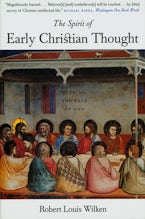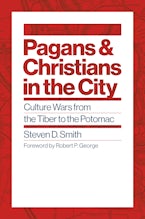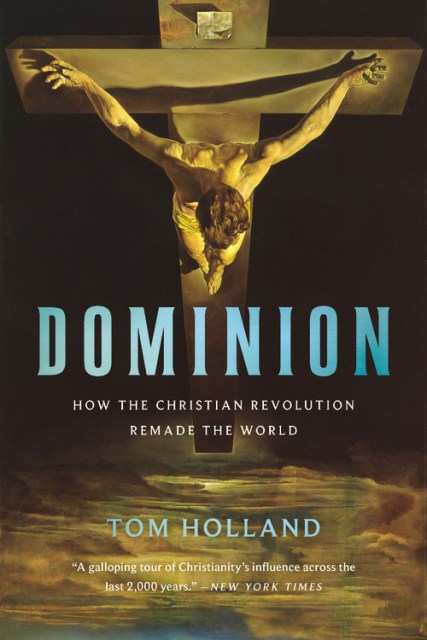Stephen Presley is the senior fellow for religion and public life at the center for Religion, Culture & Democracy, an initiative of First Liberty Institute. He also serves as associate professor of church history at The Southern Baptist Theological Seminary. His latest book is Cultural Sanctification: Engaging the World like the Early Church (Wm. B. Eerdmans).
How did the early church grow from a ragtag group of apostles in the first century to become the primary religion of the Roman Empire? This question has puzzled scholars for centuries, but given recent cultural changes, it is more relevant now than ever.
There is no question that our society is transforming in dramatic ways, and many have observed that these changes are reminiscent of the age-old struggle between Christianity and paganism. I believe that the early church speaks to us today with staggering relevance and can help inspire our ministries.
The first step is to get a clearer picture of this ancient struggle. Pagan philosophers, such as Celsus and Porphyry of Tyre, saw Christianity for what it was: a threat to destabilize the symbiosis between religion and the state. They mocked and ridiculed the burgeoning Christian community. Reading their criticisms is an amusing exercise because modern critics often levy similar arguments.
Early Christians didn’t take these accusations lying down—they actively discipled their people and defended the faith. Early Christian texts, such as Justin Martyr’s First Apology or Tertullian’s Apology, give more evidence of the church’s active engagement with political figures and the public square.
There is no reason to idolize these early Christian communities; like today, many struggled to live out their faith. However, the philosophical, moral and theological parallels between ancient and “modern paganism” (to use T.S. Eliot’s term) are unmistakable. While Christians have always embraced dual citizenship as they await the coming of the Son, pagans held fast to an immanent religiosity where glory in this life alone was their only hope.
In the modern world, however, things are even more complicated. Christian institutions, such as church and family, have always defined a believer’s identity, but now a new religiosity of the “self” reigns in the form of expressive individualism. These evolving features of self-identity redefine the very essence of what it means to be human in the modern world, where the self has turned inward to become psychologized and sexualized. This religiosity of the self rejects the theological and moral claims of the church and fashions a culture on different mores.
In this cultural morass, the early church can show us that through patience and careful cultural discernment, we can navigate the torrents of modern culture. The following books help remind us that we have been here before and give us hope that we can navigate this cultural moment with fortitude and faith.

 The Christians as the Romans Saw Them and The Spirit of Early Christian Thought by Robert Louis Wilken (both Yale University Press) each provide a panoramic view of the historic struggles between early Christianity and paganism. They should be read together to gain a comprehensive understanding.
The Christians as the Romans Saw Them and The Spirit of Early Christian Thought by Robert Louis Wilken (both Yale University Press) each provide a panoramic view of the historic struggles between early Christianity and paganism. They should be read together to gain a comprehensive understanding.
 On the Apostolic Preaching by Irenaeus of Lyons (St. Vladimir’s Seminary Press) is an ancient discipleship manual that was used to train new believers in the faith and prepare them to live countercultural lives in Roman society.
On the Apostolic Preaching by Irenaeus of Lyons (St. Vladimir’s Seminary Press) is an ancient discipleship manual that was used to train new believers in the faith and prepare them to live countercultural lives in Roman society.
 Pagans and Christians in the City: Culture Wars From the Tiber to the Potomac by Steven D. Smith (Wm. B. Eerdmans) argues that “modern paganism” is pervading our world, rooting the sacred in the self rather than the gods. This religiosity finds purpose in this life alone, not in the life to come.
Pagans and Christians in the City: Culture Wars From the Tiber to the Potomac by Steven D. Smith (Wm. B. Eerdmans) argues that “modern paganism” is pervading our world, rooting the sacred in the self rather than the gods. This religiosity finds purpose in this life alone, not in the life to come.
 Strange New World: How Thinkers and Activists Redefined Identity and Sparked the Sexual Revolution by Carl R. Trueman is a summary of his larger work, The Rise and Triumph of the Modern Self: Cultural Amnesia, Expressive Individualism, and the Road to Sexual Revolution. Trueman engages contemporary philosophers, including Charles Taylor, Philip Rieff and Alasdair MacIntyre, to explain how the modern concept of the self is transforming Western society.
Strange New World: How Thinkers and Activists Redefined Identity and Sparked the Sexual Revolution by Carl R. Trueman is a summary of his larger work, The Rise and Triumph of the Modern Self: Cultural Amnesia, Expressive Individualism, and the Road to Sexual Revolution. Trueman engages contemporary philosophers, including Charles Taylor, Philip Rieff and Alasdair MacIntyre, to explain how the modern concept of the self is transforming Western society.
 The Patient Ferment of the Early Church: The Improbable Rise of Christianity in the Roman Empire by Alan Kreider (Baker Academic) identifies the virtue of patience as an essential ingredient of early Christian cultural engagement. Cultivating patience can help strengthen churches as we walk together through these difficult days.
The Patient Ferment of the Early Church: The Improbable Rise of Christianity in the Roman Empire by Alan Kreider (Baker Academic) identifies the virtue of patience as an essential ingredient of early Christian cultural engagement. Cultivating patience can help strengthen churches as we walk together through these difficult days.
 Dominion: How the Christian Revolution Remade the World by Tom Holland (Basic Books), while not exclusively focused on the early church, argues that our modern world is indebted to the Christian faith. The church is not perfect, but time and time again, it builds things that are good and beautiful.
Dominion: How the Christian Revolution Remade the World by Tom Holland (Basic Books), while not exclusively focused on the early church, argues that our modern world is indebted to the Christian faith. The church is not perfect, but time and time again, it builds things that are good and beautiful.

